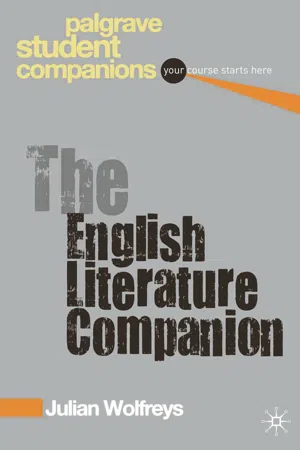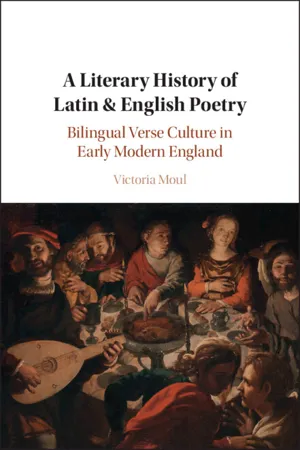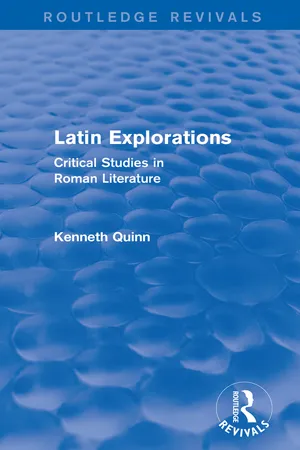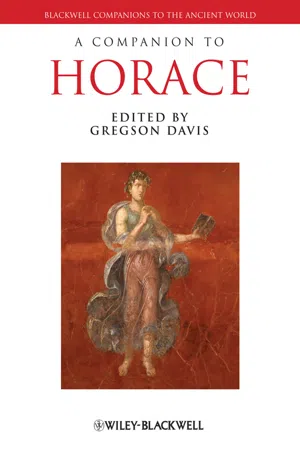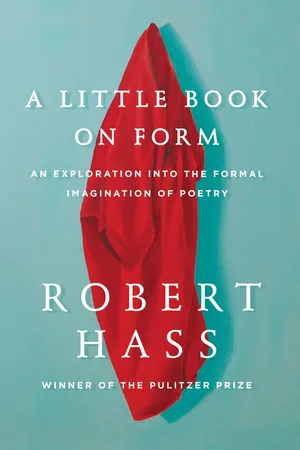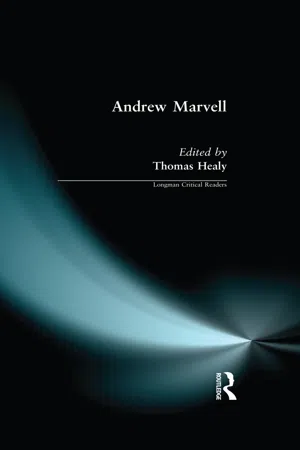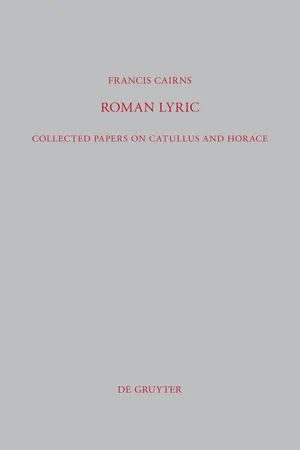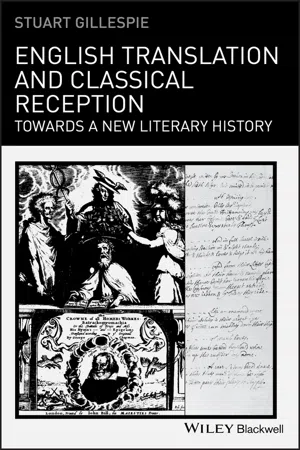Literature
Horatian Ode
A Horatian Ode is a type of poem that is characterized by its moderate and balanced tone. It is named after the Roman poet Horace, who was known for his satirical and witty writing style. Horatian Odes often celebrate the simple pleasures of life and encourage readers to enjoy them.
Written by Perlego with AI-assistance
Related key terms
1 of 5
8 Key excerpts on "Horatian Ode"
- eBook - PDF
- Julian Wolfreys(Author)
- 2017(Publication Date)
- Red Globe Press(Publisher)
From this hut, his vantage point throughout the seasons, he takes stock of the change in seasons, and perhaps his own change in fortune, and finds a necessary coherence, embracing ‘Fancy, Friendship, Science, rose-lipped Health’ (l. 50). Further lucid demonstrations can be found in Jump (1974). This is a relatively private and calm example, yet the ode could embrace political themes in the form of the Horatian Ode , and one of the most successful of these was ‘An Horatian Ode Upon Cromwell’s Return From Ireland’ (1650) by Andrew Marvell. Horace, the classical Roman poet, was renowned for his cool and dispassionate style, and his odes are balanced and even in temper. Its polar opposite was the thrillingly irregular and digressive Pindaric ode . Modelled on the intricacies of the odes of the Roman poet Pindar (518–438 bce), such odes often appear to be without a plan and entirely random. To some extent, they are virtuoso exercises, although you should try to trace the deeper consistencies in John Dryden’s ‘Threnodia Augustalis’ (1685) or Thomas Gray’s ‘The Bard’ or his ‘The Progress of Poesy’ (both 1757). The elegy The need to encapsulate what one feels when someone dies and the desire to sum up just what that person has meant to us is a common impulse, and an elegy meets that need – even when the person is not personally known to us. In the broadest terms, these lyrics are formal exercises in containing pain and loss. As Alastair Fowler has it, an elegy is ‘passionate meditation’ leading to a ‘recognition … of feeling’ (Fowler 1982: 207). Indeed, the less one has direct knowledge of the deceased, the more one can see the death in a wider frame or include less personal or anecdotal reflections. This is best instanced in two examples: John Milton’s ‘Lycidas’ (1638) and Thomas Gray’s ‘Elegy Written in a Country Churchyard’ (1751). - eBook - PDF
A Literary History of Latin & English Poetry
Bilingual Verse Culture in Early Modern England
- Victoria Moul(Author)
- 2022(Publication Date)
- Cambridge University Press(Publisher)
C r . Formal Panegyric Lyric in England, – The range and ambition of Drayton’s book of odes are striking, but as poetry it is far less sophisticated and successful than many contemporary and indeed significantly earlier Latin examples: poets at this point were still working out how to import the form into English. Throughout the first half of the seventeenth century, formal vernacular odes of public panegyric or political celebration remained relatively rare: though Jonson wrote a great deal of Horatian verse in English, including major poems such as Forest (to Elizabeth, Countess of Rutland), he did not address the monarch or, by association, the nation as a whole in poetry of this kind except in some of the songs in the court masques. His most successfully Horatian (and Pindaric) lyric remains, that is, at one remove from royalty. Scattered examples of royal panegyric lyric in English include Fanshawe’s ‘Ode Upon the occasion of His Majesties Proclamation in the yeare . Commanding the Gentry to reside upon their Estates in the Country’, and some of the English poems included in largely Latin commemorative volumes, such as Cowley’s English ‘Ode upon the return of his Majestie’ in the Cambridge anthology of , discussed further below. By contrast, Latin poems of this kind are routine: that anthology, for instance, contains poems in English but in Latin (and eight in Greek). Of those , are in lyric metres used by Horace. Horatian Self-Consciousness As we have seen, the major odes in this tradition are self-conscious, and in that sense ‘laureate’; even at their most fully panegyric, they tend to include the poet himself, and some reflection upon his calling. - eBook - ePub
Latin Explorations (Routledge Revivals)
Critical Studies in Roman Literature
- Kenneth Quinn(Author)
- 2014(Publication Date)
- Routledge(Publisher)
More recently the theory has been lent fresh life by Professor Howald, who argues that Horace, like the French symbolists, subordinated meaning to verbal poetry. 33 For Collinge, the odes are Very largely exercises in form, to the exclusion of content’ (p. viii). II, 14 he finds a sorry string of moral clichés: 34 ii. 14 (Eheu fugaces) almost looks like a cento of Horatian commonplaces—the inexorable flight of time, the tearless nether gods, the universality of death, the uselessness of attempts to evade it. No particular pattern emerges for sixteen verses, apart from a shift at v. 9 from the second to the universalizing first person plural. The four stanzas simply say that death has no regard for (1) character, (2) offerings, (3) status, (4) evasive action. Of course he is right—so long as we take it for granted the ode is a verse epistle; or, as Collinge calls it, ‘an open letter to a Roman gentleman’. But that means ignoring clear hints in the poem of dramatic form. As for being a sermon, the ode can only be regarded as an attempt at constructive moralizing (as many, less roundly condemnatory than Collinge, would allow) by ignoring the palpable clue which Horace provides, as we shall see, to warn the reader that he is philosophically uncommitted to the moralizing; and interested instead, as in iv, 13, in the situation in which the monologue is spoken, and which it evokes. The scene implied is a rather different sort of dinner party from those in i, 27 or iv, 13. The reader is once again called upon to fill in the semi-extraneous details for himself, and each reader will naturally fill them in differently. 35 A speaker (whom we should be ingenuous in taking to be Horace himself) breaks in on a conversation to address his host, Postumus, with a gloomy earnestness that comes (we may suspect, taking up a hint in the last stanza) as much from what he has imbibed of his host’s liquor as from what he has imbibed of Epicurean philosophy - eBook - PDF
- Gregson Davis(Author)
- 2010(Publication Date)
- Wiley-Blackwell(Publisher)
(17–18) nothing trivial or in a pedestrian manner, nothing of mortal cast shall I utter. In sum, Horace pronounces a bold claim to be an authenticated singer of lofty verse—in this case, grand-style praise poetry—a claim analogous to that enunci- ated in Odes 2.19, where the genre in play is choral lyric. In this diptych of Dionysian odes he elevates his tone to a “dithyrambic” level that is consonant with the Archilochian composer of fragment 120 (cited above), who portrays himself as an inspired/inebriated follower of Dionysus. Sporadic excursions into more sublime stylistic terrain on the part of lyric poets serve to establish their poetic versatility. In occasionally donning the mask of Dionysian votary in his Carmina, Horace, no less than his great predecessor Archilochus, displays the wide range of his lyric voice. The lyric ethos we have been delineating in the Odes is sometimes formulated against the background of opposing attitudes to life. Thus several odes hold up counter-examples to the carpe diem philosophy as a way of reinforcing the values of the here and now. Odes 1.25, addressed to a hapless female figure, Lydia, presents a salient instance of such a contrapuntal paradigm. The once attractive Lydia is represented as having repudiated the call of Eros in her youth, only to arrive at a pathetic and joyless old age in which a formerly repressed sexual libido returns to haunt her with redoubled force: Inuicem moechos anus arrogantis flebis in solo leuis angiportu Thracio bacchante magis sub inter- lunia uento, cum tibi flagrans amor et libido, quae solet matres furiare equorum, saeuiet circa iecur ulcerosum non sine questu, Defining a Lyric Ethos: Archilochus lyricus and Horatian melos 121 laeta quod pubes hedera uirenti gaudeat pulla magis atque myrto, aridas frondes hiemis sodali dedicet Euro. - eBook - ePub
A Little Book on Form
An Exploration into the Formal Imagination of Poetry
- Robert Hass(Author)
- 2017(Publication Date)
- Ecco(Publisher)
This poem is written in a meter modeled on a Greek poet, Asclepiades, who lived about two hundred years before Horace’s time. It seems to be a song meter, and he uses it in several of the odes when he wants to evoke the idea of a wild party. People who could read his poems at the time when Latin was a living language always comment on the combination of freedom and restraint in his poems, or spontaneity and elegance, thought to be incompatible qualities, because elegance takes time and care. The formal radiance of this poem, one has to assume, comes from that paradoxical mix. And it’s there thematically. The formal development of the poem involves several turns. There is in the first stanza the rejection of Roman gravitas and of the solemn genealogies that characterize the Pindaric ode. And in the second stanza the turn instead to preparations for the party, and in the third stanza, the elaboration of that theme in a more galloping rhythm, an address to his friend and an intensifying of the theme. And in the next stanza—in the middle of the poem—the debate between license and restraint. Horace is famously the poet of sensible restraint as a kind of practical hedonism. And so the next two stanzas are the next turn, lines for which he is famous possibly because centuries of schoolboys had to translate them under strict supervision. He wants to rave. He wants roses scattered. And then the social turn again to his friend, not to a declaration of erotic desire exactly, as in the address to a lover, but to a more sociable and conspiratorial relation to it, so that the poem doesn’t so much model eros as it does friendship. And it ends with a kind of confession. He wants to rave because he’s been driven wild. That fire does not represent freedom. A complicated and grown-up poem in which the expressiveness of the prosody and the formal development of the themes work together strikingly.10. For posterity a mix of casualness, elegance, and moderation came to characterize what people thought of as the “lesser ode.” Ben Jonson’s “Inviting a Friend to Supper” is the illustrious example of the English Horatian mode. Horace, in fact, shows up in the poem, which scholars say borrows a few lines from the epigrams of Martial. It connects to the ode as a praise poem because it models sociability and because it contains a petition. It’s an invitation. I won’t reproduce all of it here. You can find it easily. But look at the beginning:Tonight, grave sir, both my poor house and IDo equally desire your company.Not that we think us worthy such a guest,But that your worth will dignify our feastWith those that come, whose grace may make that seemSomething, which else could hope for no esteem.It is the fair acceptance, sir, createsThe entertainment perfect, not the cates.Casual elegance. Jonson does it with iambic pentameter couplet, rhymed. The pentameter gives a kind of suavity to what sounds like spoken English, the couplet form gives a kind of complementarity to the address—“grave sir” and “my poor house and I” are the antitheses—and Jonson is able to tune up or tune down the effect of the rhyme by enjambing it or not. The rhymes get particularly strong just when Horace and wine show up:Digestive cheese, and fruit there sure will be,But that which most doth take my Muse and meIs a pure cup of rich Canary wine,Which is the Mermaid’s now, but shall be mine;Of which had Horace or Anacreon tasted,Their lives, as do their lines, till now have lasted.These poems, you could almost call them anti-ode odes, have been a model for many kinds of poetry that praise poetry and the private life by not being about important subjects. It is work very much like the sensibility of Frank O’Hara and other poets of the New York School, like—in general—the informality of American poets in the postwar generation as they responded to and against the solemnity of high modernism. - eBook - ePub
- Thomas Healy(Author)
- 2016(Publication Date)
- Routledge(Publisher)
3 Such interpretations, however, have been liable to criticism as historical readings which fail to take account of the poem’s literary qualities. The terms of that antithesis need challenging: it is precisely by sharpening the analysis of the poem’s formal properties beyond a narrow conception of the ‘literary’ that it becomes possible to return it to history. Recent scholarship, in regaining an understanding of rhetoric and genre, has become better equipped to understand the links between poetry and politics. Rather than seeing the Ode as pure literature, and Marvell as an isolated genius transcending lesser poets who wrote mere propaganda, it becomes possible to recover the role of the poem’s generic acts in a far wider cultural movement. In the analysis of the poem as act, many questions remain to be answered: Marvell’s own personal allegiances and the circumstances of the poem’s production and reception remain obscure. I believe, however, that the hypothesis of the Ode as radically revisionary opens the way to making more sense both of the poem and of its context.Both parts of the poem’s title arouse royalist expectations. In giving the bald generic characterisation ‘Horatian Ode’ – as far as I know uniquely – Marvell evoked the royalist admiration of Horace, with his cult of peace under a worthy emperor. In an Ode of 1630 Sir Richard Fanshawe celebrated Charles’s preservation of the peace while ‘warre is all the world about’.4 Marvell himself had written a monarchist Horatian Ode, a close imitation of the second ode of the first book which he contributed to a volume of panegyrics in 1637. In the aftermath of the Second Civil War there had been a resurgence of royalist Horatianism, and Fanshawe’s Ode was one of many ceremonial poems from the 1630s which were published as a loyal gesture in the period leading up to the regicide. The other element in the title, the reference to a return, is also a strong generic signal. Renaissance rhetoric recognised a distinct kind of demonstrative or panegyrical oration, a celebration of a hero’s return, a prosphonetikon or epibaterion. Horace’s odes were regularly classified in Renaissance editions according to panegyrical genres: for example, the fourth ode of the fourth book, long recognised as one of Marvell’s chief models for his Ode, was classed as a prosphonetikon. - eBook - PDF
Roman Lyric
Collected Papers on Catullus and Horace
- Francis Cairns(Author)
- 2012(Publication Date)
- De Gruyter(Publisher)
On one account the ode is a set of instructions for a hymn and the speaker is Horace. 24 On the other the ode is a hymn sung by a choir of boys and girls. 25 The literary skill and sophistication which commended Ode 1.21 to its original au-dience lie at the root of this dispute. Whereas the second view, i.e. that the ode is a hymn sung by a chorus, 26 is, I believe, the better way of describing the ode, substantiation of this view requires that those conventions which make the ode appear to be in accordance with the first view, i.e. a set of instructions on the part of Horace, should be taken into consideration. _____________ 22 Before the birth of Apollo and Artemis, Delos was called by another name. Most etymologies of Delos in antiquity refer to their birth. Cf. R.-E. s.v. Delos 2 (IV, col. 2502). 23 Cf. Juv. 1.81 f.: ex quo Deucalion nimbis tollentibus aequor / nauigio montem ascendit , etc. 24 For this view cf. e.g. G. Williams, Tradition and Originality in Roman Poetry , pp.154ff., 211f. and Nisbet–Hubbard, ad loc. (but see note 27 below). 25 For this view cf. Wilamowitz, Hellenistische Dichtung , II, pp.290f. 26 Naturally I am not implying that Ode 1.21 was written for performance in real life; only that Horace composed it in the tradition of early Greek choral lyrics. Odes 1.21 and 4.6 197 442 These conventions have been demonstrated in a recent article by W.J. Slater. 27 In section 2 of this article, Slater, whose main interest is in Pindar, sets out evidence which shows that in early Greek choral lyric (a) Instructions, directions, statements can be found which refer to what is actually being sung, i. e. the lyric can include built-in stage directions. (b) These instructions or built-in stage directions can take many forms including addresses to the chorus put, like the rest of the lyric, into the mouth of the chorus. (c) That hence what Slater calls ਥȖઆ in the poems, i.e. - eBook - PDF
English Translation and Classical Reception
Towards a New Literary History
- Stuart Gillespie(Author)
- 2011(Publication Date)
- Wiley-Blackwell(Publisher)
As will be seen, I am particularly concerned to ask how far it can mesh with the responses of those Horatian readers upon whose bookshelves it is perhaps least likely to have a place: Latin scholars of the present and the recent past. A complete text of Dryden’s translation appears as an Appendix to this chapter. ♦ ♦ ♦ It is much more difficult to discover English poets of the later seventeenth century who were not imitators of Horace than to name ones that were. Between 1660 and 1700, new translations and adaptations of poems from the Odes alone were published by at least 50 different hands. 3 If the frequency with which gentleman-authors turned out their versions of Horatian Odes did not quite match the rate achieved a generation or two later, in Pope’s heyday, the uniformity of their pro-ductions and, one may thus infer, of their response to the Odes was perhaps even greater. Dryden himself is conventional enough in classifying the Odes in the Preface to Sylvae into ‘panegyrical’, ‘moral’ and ‘jovial’ types, and in his apparent preference for the latter. 4 And the ‘jovial’ Horace – the bon viveur , the voluptuary, the lover – is a figure so frequently encountered in later seventeenth-century translators’ work that we must suspect the period’s usual sense of the poet to be extremely selective, if not positively eccentric. At least, as seen with the benefit of several centuries of hindsight, most Restoration efforts to present this favourite Horace in English translation very clearly reflect the translators’ own tastes and conspicuously lack qualities found in the Odes by readers of other periods. Horace tends to be made a spokesman for the Restoration gentleman’s ‘libertine’ 2. Keegan (2000). Or there are the impressions of Emrys Jones: Dryden’s ‘versions of Lucretius and Juvenal and his paraphrase of Horace’s ode … are now recognized as being among his finest poems, and no selection of his poetry is likely to leave them out’.
Index pages curate the most relevant extracts from our library of academic textbooks. They’ve been created using an in-house natural language model (NLM), each adding context and meaning to key research topics.
